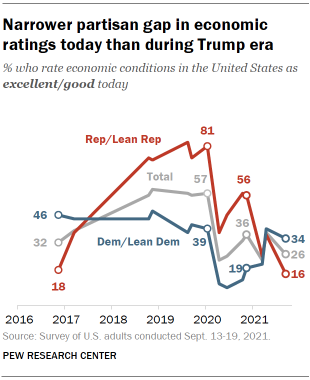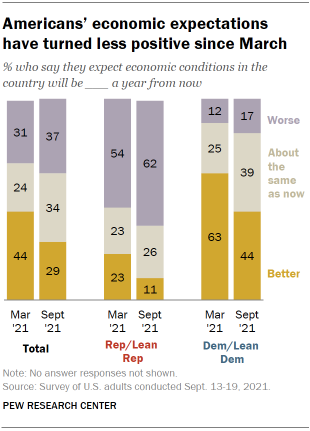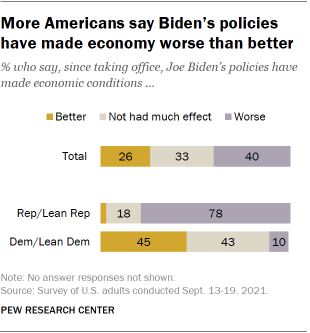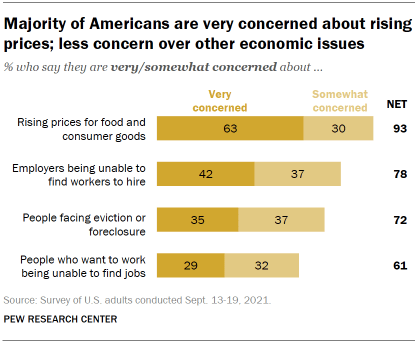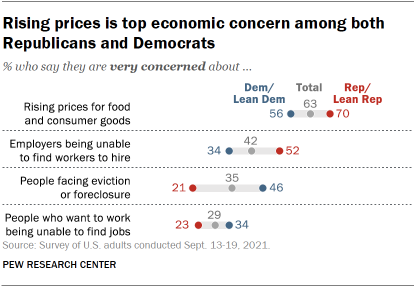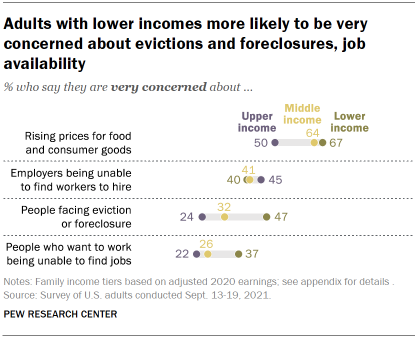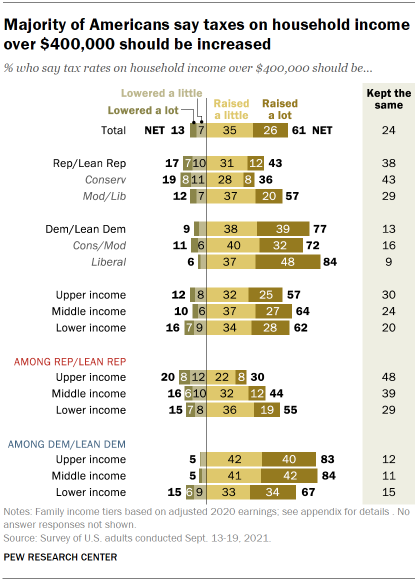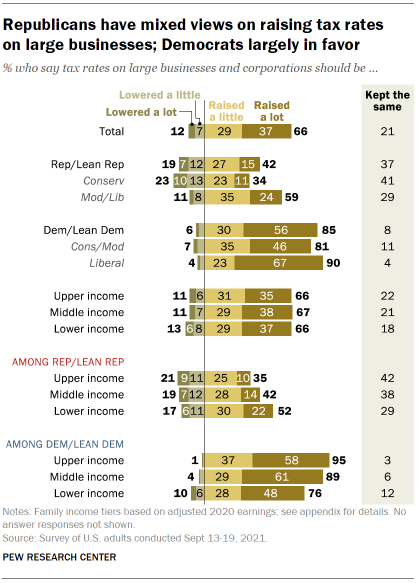As the country continues to struggle with the coronavirus and its effects on public health and the economy, only about a quarter of U.S. adults (26%) rate national economic conditions positively. About three-quarters (74%) say current economic conditions are only fair or poor.
Overall, the share who say economic conditions are excellent or good is roughly on par with the share who said this in April 2020 (23%) – shortly after the coronavirus began spreading throughout the United States – but slightly lower than they were earlier this year.
Partisan views of the economy have shifted since Joe Biden became president. Today, Democrats hold more positive ratings of the economy than do Republicans – a reversal from when Trump was in office.
In November 2020, shortly after the presidential election, more than half of Republicans and Republican-leaning independents (56%) said that the economic conditions of the country were either excellent or good. Today, just 16% say the same; 84% of Republicans say the economy is only fair or poor.
Conversely, Democratic views of the economy are more positive today than they were in November 2020. Then, roughly two-in-ten Democrats and Democratic leaners (19%) said that economic conditions were either excellent or good. Now, about a third of Democrats (34%) rate the economy positively.
Today, Americans are less optimistic than they were in March that economic conditions in the country as a whole will improve over the next year.
Just 29% of adults say they expect that economic conditions a year from now will be better than they are at present. This is lower than the share that said this in March (44%). Currently, about a third (34%) say the economy will be about the same, while 37% say that the economy will be worse a year from now.
Positive expectations for the economy have declined among members of both parties. The share of Democrats who say economic conditions will be better a year from now has fallen 19 percentage points since March, from 63% to 44%. And just 11% of Republicans now expect conditions to improve in a year, down from 23% in March.
Wide partisan split in views of impact of Biden’s policies on economy
About a quarter of Americans (26%) say that, since Biden took office, his policies have made the economy better, while 40% say they have made economic conditions worse; a third say they have not had much of an effect
An overwhelming share of Republicans (78%) say that Biden’s policies have made the economy worse since he has taken office; just 3% say that his policies have made the economy better, while 18% say they have not had much of an effect.
Democrats are evenly divided between those who say Biden’s policies have made economic conditions better (45%) and those who say his policies have not had much of an effect (44%). One-in-ten Democrats say his policies have made conditions worse.
Rising prices top list of public’s economic concerns
While substantial shares of Americans express concern about several economic issues – including a shortage of workers and people facing eviction and foreclosure – more say they are very concerned about rising prices than say this about other economic problems.
A 63% majority say they are very concerned about rising prices for food and consumer goods (another 30% are somewhat concerned). Smaller shares say they are very concerned about employers being unable to find workers to hire (42%), people facing eviction or foreclosure (35%), and people who want to work being unable to find jobs (29%).
Economic concerns differ by both party and family income. Majorities in both parties say they are very concerned about rising prices, but Republicans are more likely than Democrats to say this (70% vs. 56%). A larger share of Republicans (52%) than Democrats (34%) also are very concerned about employers not being unable to find workers.
By contrast, more Democrats than Republicans say they are very concerned about people facing eviction or foreclosure (46% of Democrats, 21% of Republicans) and about people who want to work being unable to find jobs (34% of Democrats, 23% of Republicans).
Across income levels, Americans express broad concern with rising prices for food and consumer goods. At least half of upper-income (50%), middle-income (64%) and lower-income (67%) adults are very concerned about rising prices.
However, lower-income adults are more likely than middle- and upper-income adults to be very concerned about people facing eviction or foreclosure (47%) and about people who want jobs being unable to find work (37%). Fewer than a quarter of upper-income adults are very concerned about either economic issue.
Roughly similar shares of upper- (45%), middle- (41%) and lower-income (40%) Americans say that they are very concerned about employers being unable to find workers to hire.
Wide partisan divides over raising taxes on wealthy Americans, large businesses and corporations
About six-in-ten Americans (61%) say tax rates on household income over $400,000 should be raised either a lot (26%) or a little (35%). Just 13% say that these rates should be lowered. About a quarter (24%) say tax rates on household income over $400,000 should be kept the same as they are now.
Democrats are largely in favor of raising taxes on household income over $400,000: 77% say these tax rates should be increased, including 39% who say they should be increased a lot. Only 9% of Democrats say these tax rates should be lowered, while 13% say they should be kept the same.
Liberal Democrats (84%) are more likely than their conservative and moderate counterparts (72%) to say taxes on household income over $400,000 should be raised, though this is the clear majority view in both groups.
Views among Republicans are more mixed: 43% say tax rates on household income over $400,000 should be increased, while 38% say they should be kept the same. Only about two-in-ten (17%) say tax rates on these household incomes should be lowered.
A majority of moderate and liberal Republicans (57%) say tax rates on household income over $400,000 should be raised at least a little. By contrast, 36% of conservative Republicans hold this view. About four-in-ten conservative Republicans say these tax rates should be kept the same.
Among the general public, majorities of adults across income tiers say taxes on household income over $400,000 should be raised. But there are substantial differences in views by household income within partisan groups.
Republicans with lower incomes are much more likely than middle- or high-income Republicans to say tax rates on household income over $400,000 should be raised: 55% of lower-income Republicans hold this view, compared with 44% of middle-income Republicans and 30% of upper-income Republicans. About half of upper-income Republicans (48%) and about four-in-ten middle-income Republicans (39%) say tax rates for households with incomes over $400,000 should be kept the same as they are now.
Among Democrats, those with lower incomes are the least likely to say that tax rates on household income over $400,000 should be increased – though majorities across income groups say rates should be raised. While about eight-in-ten upper- (83%) and middle-income Democrats (84%) say tax rates for these households should increase, about two-thirds of lower-income Democrats hold this view.
The public also broadly supports raising taxes on large business and corporations. Roughly two-thirds of Americans (66%) say tax rates on larges business and corporations should be raised a lot or a little. Only 12% say tax rates for these businesses should be lowered, while about two-in-ten (21%) say tax rates should be kept the same as they are now. Views on this issue are largely unchanged since 2019.
A large majority of Democrats (85%) say taxes on large businesses and corporations should be increased, including more than half (56%) who say taxes on these groups should be increased a lot. Just 6% of Democrats say tax rates on large businesses should be lowered, while just 8% say they should be kept the same as they are now.
While a majority of Democrats across income tiers say that tax rates on businesses and corporations should be increased, Democrats with lower incomes (76%) are less likely than middle- (89%) and upper-income Democrats (95%) to say these tax rates should be raised.
By contrast, about four-in-ten Republicans (42%) say tax rates on large businesses and corporations should be raised, while a slightly smaller share (37%) say they should be kept the same as they are now. About two-in-ten Republicans say that these taxes should be lowered.
Among Republicans, there are wide differences in views by ideology and family income. A majority of moderate and liberal Republicans (59%) say taxes on large businesses and corporations should be increased, compared with about a third of conservative Republicans (34%). And while about half of lower-income Republicans (52%) say tax rates on large businesses and corporations should be raised, middle-income (42%) and upper-income Republicans (35%) are less likely to say this.


